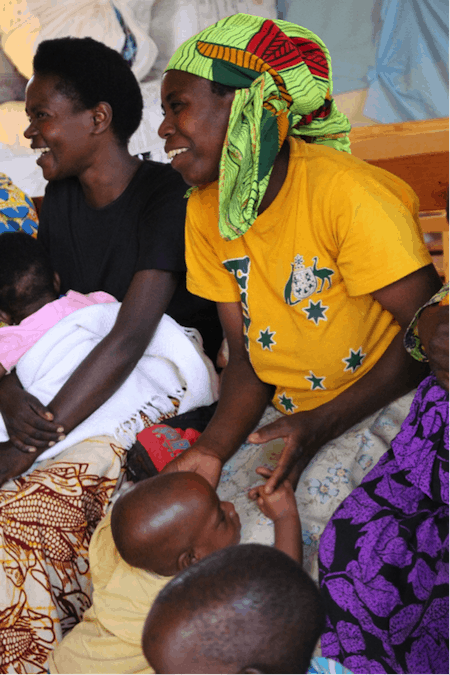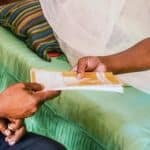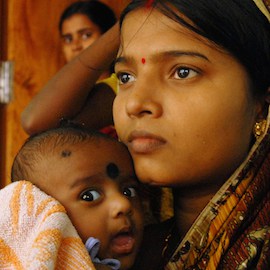NexThought Monday: How Mindset Shifts Improve Health Care
Imagine that you are Sarafina, an HIV-positive teenage mother, and your infant daughter has been diagnosed with moderate malnutrition every month for the past three months. The community health workers in your rural African village go through the steps required by government protocols each month. They provide health education, and even do a home visit. They say little when you return for the fourth month and find that your child continues to be malnourished. This time your daughter is diagnosed with severe malnutrition and she is referred to the hospital. You arrive at the hospital three days later, after you have gathered the funds needed for travel. When you arrive, the doctors tell you that “only time will tell.” Sadly, after two weeks in the hospital, your daughter loses her battle to survive.
You believe that the health care providers did not act quickly enough and did not truly care about your child. In contrast, the health care workers felt helpless to change the situation and quietly believed that a fast death for your child may not be worse than prolonged suffering from malnutrition and poverty that would ultimately have the same deadly outcome.
This true story is an extreme example of what can happen when the providers and recipients of health care have lost faith in their ability to control health outcomes.
When providing care to marginalized populations, whether in Rwanda or the United States, poor health outcomes can seem inevitable. Even when the knowledge needed to change the outcome is available, the barriers to change can seem insurmountable. In many ways, believing that “it is in God’s hands now” is much easier to live with than believing that you have the power to save someone’s life and take the risk of acting on this belief, only to be unsuccessful. Denial and acceptance of the “inevitable” become a protective response to the tragic situation. At The Ihangane Project, the nonprofit health care organization I started in Rwanda, we call this a “scarcity mindset.”
 Now, let’s imagine a different scenario. Philomena (right, black shirt), an HIV-positive mother living in rural Rwanda, discovers she is pregnant and is referred to one of the seven health centers in the catchment area of Ruli District Hospital that works with The Ihangane Project. She participates in the mother to child transmission (PMTCT) of HIV program and, each month, her child is evaluated for malnutrition and HIV, and she is offered health education sessions with other HIV-positive moms. In addition to traditional health education, she learns about topics such as “saving for a newborn” and “sustainable agriculture techniques.” During these sessions, Philomena shares challenges to implementing what she is learning with other mothers and, together, they brainstorm ways to overcome these challenges. When barriers to quality care are identified, Philomena and all the HIV-positive mothers in the PMTCT program are encouraged to contribute their ideas to improving the system of care.
Now, let’s imagine a different scenario. Philomena (right, black shirt), an HIV-positive mother living in rural Rwanda, discovers she is pregnant and is referred to one of the seven health centers in the catchment area of Ruli District Hospital that works with The Ihangane Project. She participates in the mother to child transmission (PMTCT) of HIV program and, each month, her child is evaluated for malnutrition and HIV, and she is offered health education sessions with other HIV-positive moms. In addition to traditional health education, she learns about topics such as “saving for a newborn” and “sustainable agriculture techniques.” During these sessions, Philomena shares challenges to implementing what she is learning with other mothers and, together, they brainstorm ways to overcome these challenges. When barriers to quality care are identified, Philomena and all the HIV-positive mothers in the PMTCT program are encouraged to contribute their ideas to improving the system of care.
One example of system improvement involves testing for HIV-exposed infants. Health centers are expected to do regular HIV testing at particular intervals, but this was only happening 8 percent of the time at the health centers where The Ihangane Project works. To address this challenge, health center nurses and HIV-positive mothers worked together to understand the barriers to appropriate testing.
At one rural Rwandan health center participating in the project, women were so fearful of learning the HIV status of their infant that they avoided testing. Conversely, at a different health center participating in the project, mothers essentially proclaimed, “We are ALWAYS ready to receive our test results. We know we have done everything we can to protect our children and we know they will be fine.” These confident mothers, feeling empowered by knowledge and belief in the power of their actions, now support other mothers through the testing process. Testing rates at the seven health centers working with project have increased by 800 percent, while rates of HIV transmission from mother to child have decreased by 63 percent, to rates lower than those in the United States.
One group of women expressed fear, reflecting the risk they took in believing that their actions could lead to better outcomes for their children and their uncertainty over whether their efforts would pay off. The other group of women had moved beyond this fear to trust that the investment they made would manifest in better health for their children. These confident women serve as role models and mentors to their less-assured peers. At The Ihangane Project, we call this an “abundance mindset.”
The Ihangane Project builds capacity for providing high-quality care that leads to sustained good health outcomes. We began with an initiative that integrates Rwandan Ministry of Health protocols for eliminating mother-to-child HIV transmission with the Ruli community’s priority to control childhood malnutrition. The project teaches health care workers how to explain the reasoning behind clinical protocols, and utilizes data trends to demonstrate the improvement in health outcomes that can be achieved when protocols are followed appropriately. The unique Continuous Quality Improvement program creates an environment for learning that will continue beyond Ihangane Project support. More than 300 HIV-positive mothers have participated in this program and we are hoping to expand to an additional 11 health centers in the next two years.
Rather than adding costs to rural health care, existing resources are simply shifted to better support the relationship between health care providers and patients. In fact, health centers participating in the project are receiving increased revenue through improved pay-for-performance reimbursement from patients. We ensure local ownership through a steering committee that will be completely responsible for all aspects of the program by 2017. Fortified porridge that is distributed at the health centers is produced locally, and the cost will be subsidized by sales to the community by the end of this year. Not only is this approach scalable, but essential to fostering local innovation within severe resource constraints.
As these women and their health care providers move from denial to fear and then to confidence, amazing results emerge. Every month, they share challenges they face and support one another with ways to overcome them. This creates a multiplier effect. At several health centers, women are forming their own savings groups. Others are joining the local artisan cooperative to learn new skills and generate income. Still others are creating small businesses together. Hope and investment in the future are blossoming.
How did this happen? At The Ihangane Project, we believe in a simple premise: The relationship between the health care provider and recipient is the essential link to reach good health outcomes, and it is most effective when both parties feel valued, capable and hopeful in the future.
Philomena’s health care providers have found a way to bring Ministry of Health protocols to life because they now understand the rationale behind those protocols and believe that their actions will lead to improved outcomes, despite their limited resources. Mothers are considered valuable assets in care provision and are engaged in system improvements. Meaningful data trends are used to identify and celebrate successes. When barriers to care are encountered, everyone works together to find solutions. Health care providers integrate relevant cross-sector educational sessions because they recognize the connection between financial stability, food security and sustained good health outcomes.
Imagine the impact that is possible when empathetic, equitable and effective relationships are the hallmark of strong health care delivery systems around the world. Rather than a centralized approach that trickles down to a periphery of scarce resources and disengaged stakeholders, health systems should preserve the relationship between providers and recipients of care and celebrate local innovation within the existing infrastructure.
Even the most marginalized members of society have the capacity to shift their mindset from one of scarcity to one of abundance with the right set of tools. The healing power of true health care delivery has the potential to transform communities and the world.
Dr. Wendy Leonard founded The Ihangane Project in 2008.
Photos courtesy of The Ihangane Project
- Categories
- Health Care



